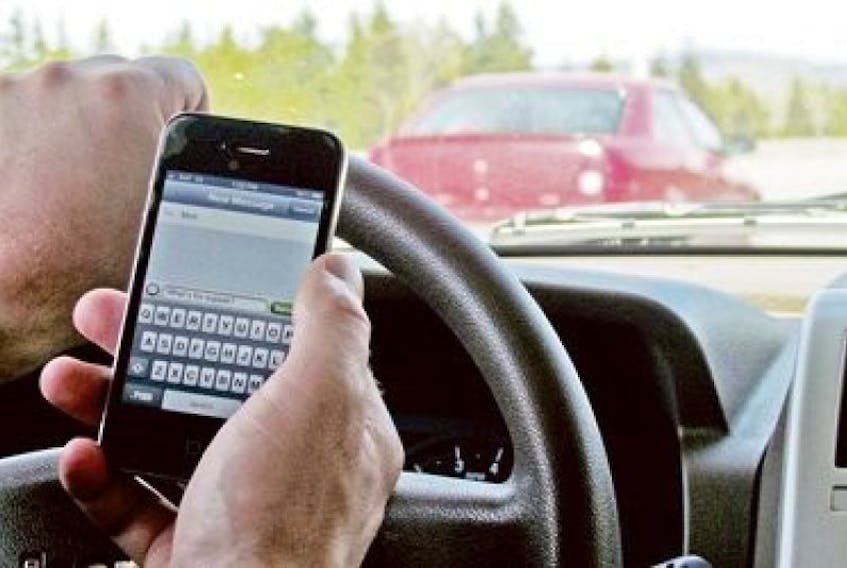I’m sorry, but I’ve been driven to this.
Or, at least, I’ve been driving towards it. And stopped behind it — and almost put off the road by it.

I think there has to be a change.
Right now, all four of the Atlantic provinces don’t allow drivers to use hand-held cellphones while driving. The legislation’s a little different in each jurisdiction, with the best legislation being in Prince Edward Island and Newfoundland and Labrador.
Why are they the best? Well, the way the legislation is crafted makes convictions easier. Those two jurisdictions make it a violation for drivers to even hold a cellphone — meaning officers who want to ticket offenders don’t have to go through the legal rigmarole of proving that the offender was actually texting or talking when he or she gets pulled over.
But leave that aside.
Even in P.E.I. and Newfoundland and Labrador, the legislation doesn’t go far enough.
Over the last few months, I’ve driven several thousand kilometres in the Atlantic provinces, with at least a little driving in all of them (most of it in Newfoundland and Nova Scotia), and what I’ve seen is a serious addiction to electronic communication.
I though he was drunk — when he finally took a right, I passed and saw him talking on his phone, his eyes distant.
I’ve been passed on divided highways by cars where drivers had their phones on the steering wheel, texting. I’ve been stuck behind cars that fail to notice that a traffic light’s turned green, sometimes for the entire duration of the green light. In July, in just that sort of instance, when the SUV in front of me finally noticed the green light, he turned and drove for six blocks with the lane dividing line precisely under the centre of his car, wheels in both lanes.
I though he was drunk — when he finally took a right, I passed and saw him talking on his phone, his eyes distant.
I understand the Pavlovian pull of the cellphone. When I’m driving and I feel my phone trembling away in my pocket, I experience the urge to answer it, or to see who is messaging me and what they want. But I take the conscious decision not to answer, or to look, until I’ve safely found a place to pull over.
Near Gander a week or so ago, I took a call hands-free — about a family member who had been in a simple, non-injury car accident. I don’t think I’ll ever do it again.
Because, what I realized after the call was over is that while I could remember everything about the call, right down to imagining where he went off the road, what it must have looked like, what kind of damage there was to the car, I couldn’t remember even one bit of the road from outside Gander to where the call ended. Did I pass anyone? Was I passed? Were there different speed limits? Was I speeding?
Even though I wasn’t holding a phone, it’s clear that, for the duration of that call, I was a distracted driver.
What do I think should happen? First off, if you’re a driver and you’re holding a phone — even if it’s turned off or the battery is dead — police should be able to charge you. But more, I don’t think there is any acceptable use of an electronic device if you’re driving.
Allowing hands-free calls is no different from letting people use any cellphone — your head still goes to a distant place when you’re on the line with someone else. And that place isn’t driving.
I’m not a heart surgeon. I’m a writer and a columnist. It’s more than unlikely that I have to take a call to save someone’s life.
So why should I take a call that threatens someone else’s? Why should you?
Russell Wangersky’s column appears in 36 SaltWire newspapers and websites in Atlantic Canada. He can be reached at [email protected] — Twitter: @wangersky.









